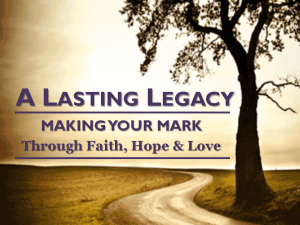
This New Year is the appropriate time to make a resolution; the occasion to link advance care planning with a spiritual legacy. People all have deep-seated values and determinations of what they are willing to pay for, live for and die for, but few actually document these for caregivers or posterity. Beginning in 2016, Medicare will begin to reimburse physicians for end-of-life counseling. However, throwing taxpayer dollars at no-win situations is potentially invaluable or a waste of money. This New Year presents the opportunity for a change of heart – a winning formula that promotes have it your way at the end of life. Successful people are often spiritually motivated to achieving their goals. Interestingly, a documented goal is much more likely to be attained, becoming a lifelong affirmation.
A gut-wrenching situation occurred during a conversation I had with a 49-year-old gentleman whose heart was failing. He was once a martial arts enthusiast, but at the time was experiencing significant liver bloating due to fluid congestion. His heart had been severely weakened due to a septal defect and his only hope for survival was to undergo a heart transplant. In reality, his heart was not in it to win it and he essentially wished to stay alive in order to spare his 83-year-old mother the pain of having to endure the loss of another child. This predicament prompted me to consider the spiritual repercussions of my having a heart transplant. Would I discard my heart and entrust my soul to the healthcare system for the chance to sustain my life?
Self-preservation is a powerful primal instinct, while death and dying might be considered a contest between human nature and spiritual existence. With the new-found perspective being given to end-of-life counseling, it is important to not default to the time-old conversation that involves a menu of sickening choices. Given the opportunity to create a spiritual legacy beyond advance care planning, a majority of patients may prefer to be enlightened about the sweet surrender available on the dessert menu. This type of spiritual craving grants people permission to indulge themselves in dying, providing the upper hand through engaging the higher power of the heart’s good conscience. Enlisting good conscience over fear mongering during end-of-life counseling fosters a spiritual legacy that moves beyond wishful thinking.
If you ask not what your physician can do to keep you alive, ask what you can do to die peacefully, you will quickly learn that most physicians have very little practical experience with helping people die. A majority of patients’ lives end through extreme exhaustion rather than personal empowerment. A physician will often turn a blind eye to patients in the throes of dying, feeling morally and legally obliged by high expectations and impositions of caregivers. Furthermore, physicians have seemingly evolved from being humanitarians to having become effective team players and business people. Wishful thinking in regard to the personal relationship between patient and physician has truly become a forgone conclusion in what is quickly becoming the lost art of medicine.
Good conscience rightfully informs caregivers that medical intervention becomes unnecessary and inappropriate once a patient becomes incapacitated. However, all too few believe that withholding or withdrawing treatment in these situations may actually be conscientious and ethical. When grief and sorrow abound at the end of life, pity often overtakes good conscience and granting patients end-of-life wishes becomes more guarded. Advance care planning essentially permits caregivers to never need to say you’re sorry to loved ones and promotes letting go, allowing a patient’s personal destiny and pre-determined spiritual legacy to manifest.
Reflecting on the potential inherent to the New Year through creating a life resolution is heartening and just might ignite celebratory fireworks. The brilliance of a spiritual legacy as reflected in fireworks is a reminder that what goes up must come down. A spiritual legacy as a matter of the heart involves listening to the desires of the heart that prompt peaceful resolution. Dare to dream and dare to do or die from the power vested in your heart, not in the medico-legal system. Purposely resolve to document your wishes in writing. Guidelines lessen and resolve conflict, leading to happily ever after and the feeling that wishes really do come true. Peace begins with having wishes to die for as a spiritual legacy and New Year’s resolution in 2016.
Leave a Reply